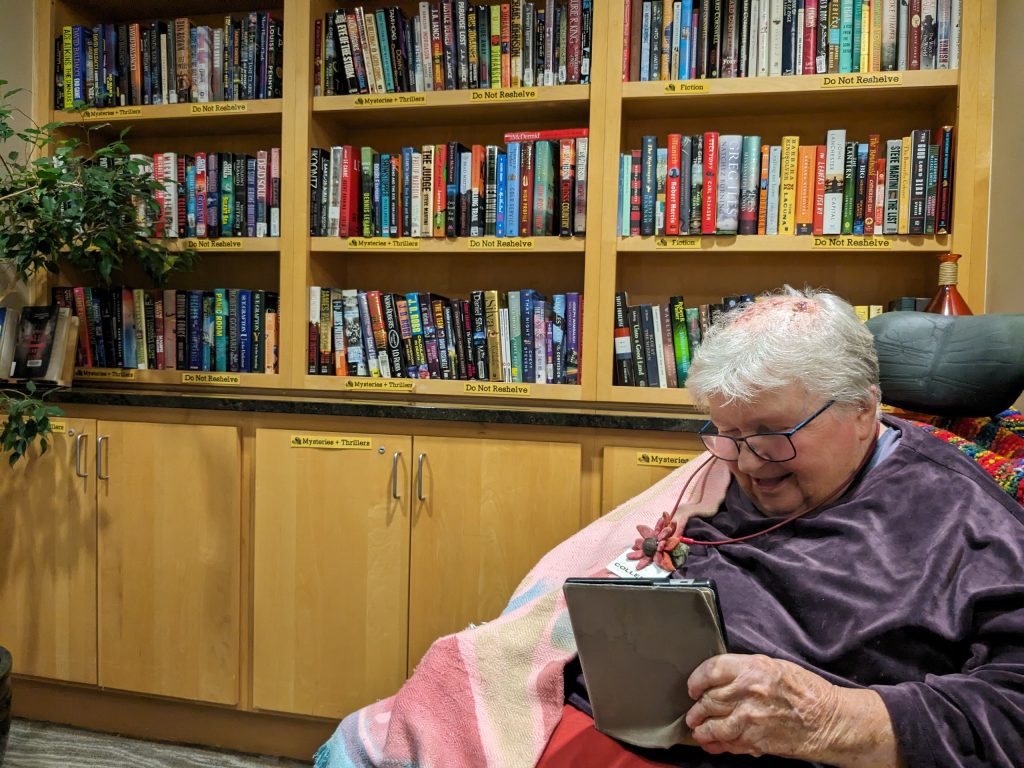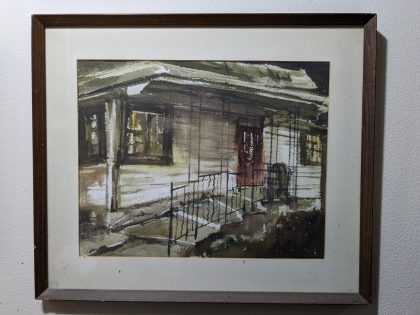GREAT NEWS!
If you are among the many — and they are legions — thinking about becoming a librarian, but you are still unsure, then, from this librarian to you, have fun with these food-for-thought, self-aware questions and books to help you realize all that you are missing. Become an Information Warrior in the battle to save our democracy. Well, that and be sure to VOTE!

Shelves and Kindles hold books; librarians choose and suggest. Life is good. [Right, Ace?]
Do you love murder mysteries? Liking them is okay, but loving them is better. Do you think about search strategies and the nature and quality of information? Examples; A Daughter of Time by Josephine Tey. Classic. The Li Du Trilogy by Elsa Hart. Imperial Librarian in 18thC., southwestern China. Joe Pickett series by C.J. Box. Wyoming Game Warden, Joe, and Town Librarian and wife, Marybeth team up to search.
Do you wonder what ‘helps’ library users use, e.g. collections, connections, reference works, librarians, to find and get what they need? Do you think autodidacts should be library users? Do you think we should all be autodidacts? Examples; ‘Elmore’s Legs’ by Alec Wilkerson is a profile of Gregg Sutter, the researcher for Elmore Leonard, the mystery writer, emphasis on ‘writer.’ The Unruly Pleasures of the Mid-Manhattan Library by Ada Calhoun is an article / valentine to the many nearby libraries and librarians that she uses and loves. Believing is Seeing by Errol Morris, [esp. Chapter on Crimean War photos] reports his investigations into the hidden truths behind a series of documentary photographs,… [then] into the nature of truth in photography. The Road to Ubar by Nicholas Clapp is a great search in and out of libraries to find the lost city of Ubar in Southern Arabia. Clear Pond, The Reconstruction of Life by Roger Mitchell is ‘an archeological investigation’ into the life and times of one Israel Johnson, an early 19th-century millwright and settler of the Adirondacks.’ Maybe only a librarian could love this.
Do you wonder what goes on in a library? Examples; The Paris Library by Janet Skeslien Charles is based on the true story of the heroic librarians at the American Library in Paris during World War II. What You Are Looking For Is In The Library by Michiko Ayoama A ‘humongous, enigmatic Librarian’ gives each of five users a reading list with one ‘outlandish’ book. [Goodreads.] The title was too good to ignore. Even though the librarian sounds more like a ‘philosophical counselor’’ [new to me and interesting], they both try to ‘find the right book at the right time’, so I included it.
Do you wonder what people choose to read and why? Do you surreptitiously check titles being read by others at lunch or on the bus or on shelves of disarray? Examples; So Many Books, So Little Time by Sara Nelson. So many reasons, too. ‘By the Book’ is a NYT weekly interview with an author. Useful, fun-to-read, hard-to-find info, e.g. ‘What books are on your nightstand?’ and ‘What are you going to read next?’ Carlos Lozada’s NYT column, ‘I Read These Books So That You Don’t Have To’ is a great primer on ways of reading and a bibliography of what and why he reads what he does. If only information junkies think good newspapers are must reads, then consider librarians fellow devourers, who re ready for the day’s questions. The Reading List by Sara Nisha Adams is in my ‘to read’ pile and looks promising.

Schaumburg Township District Library — early days, good times, aging well. [Painting by Norma Simone. Photo by Charlie.]
Do you wonder where information comes from and/or where it may be going? Information spreads or may be dormant, but it is never dead. Think spreading threads of thought that develop from creative searches of mass media, conventional publishing, scientific research, government documents, self publishing, social media, Internet storage, mergers, multiple formats, library connections, A.I., etc., and librarian search tools to help sort through it all. Examples; The Thread: A Mathematical Yarn by Philip J. Davis does not mention librarians, but should, as he notes that `not the truth, but the search for the truth; the process, the method, that is what matters’’… The Book Nobody Read: Chasing ‘The Revolutions of Nicolaus Copernicus” by Owen Gingrich records finding some 600 Renaissance-era copies of “De Revolutionibus” all over the world, especially in eastern European libraries, noting how thoroughly the work was read in its time, and how word of its theories spread and evolved. Rolling Stone’s article, ‘Pizzagate, Anatomy of a Scandal’, is an early example of social media threads.
Do you read the bibliography, [community of contributors] and maybe the notes [often spicy asides], with a peek at the index [sometimes wickedly written entries], before you read the book? Citing sources matters, especially with plagiarism increasingly in the news, misinformation everywhere and A.I. muddying even more these already murky waters. The Center for an Informed Public, University of Washington, CIP, researches the way false, unverified and misleading information plays out in a variety of arenas. Its analyses of elections and the pandemic, in particular, have unleashed conservative furor. It is just plain exciting and a godsend for librarians in the midst of change and a time of trouble.
Examples of citing sources; A Pilgrimage to Eternity; from Canterbury to Rome in Search of a Faith by Timothy Egan. a classic bibliography from ‘a meticulous researcher and a skilled storyteller [WaPo]. It reminds me of the liberal arts days that I loved. His newest book, A Fever In the Heartland by Timothy Egan is good, maybe even important to read, and has a many-paged, equally fine, if different section on sources. Letters to an American by Heather Cox Richardson is a daily current events rundown [on Substack] with meticulously cited tech-savvy sources in the text and in endnotes, which is a major trust-builder. Where’d You Go, Bernadette? By Maria Semple follows a teenager’s search for information to help find her mother. The sources she finds and chooses to use propel the plot. I don’t think you have to be a librarian to notice this, but it might help, and I loved the book. Some Glad Morning, Poems By Babara Crooker includes a page of ‘NOTES’, which I read as a page of ‘INFLUENCES’, a kind of recognition that we all stand on the shoulders of others. Two examples of her entries; “I Can’t Write a Poem About McDonald’s” is after a poem by Ron Wallace, and “Useful” is after a poem by Naomi Shihab Nye.
Enough! you cry, if you’re still with me. Rest assured, there’s more to come. Groan.

Hi,
A reading list for the ages! I can think of several people to whom I’ll send this, including my sister, erstwhile archivist at the Royal Danish Library.
PERFECT!
As always Colleen this is a blog post to read and re- read! Thank you
Thanks for this list. A related work is Dennis Duncan’s Index, History of the, full of amusing and serious reflections on access to the contents of books.
Hi Virginia, Thanks for the quick and useful response. Duncan is a great addition. My ‘organization’ examples are essential, and wanting in the profile. I feel an amended or extended list stewing. I am lucky to have Katie and Kin in my life. Colleen
Yikes-I could never catch up to your reading list and synopses. But it is fun to consider at least a couple in the near future.
I don’t have any new ones to offer as yet, but when I get the time I will be sure to look for your favorites: sci-fi and psychological analyses -the best!
Wonderful library connections. As it happens, the action in the mystery I’m reading occurs in the building housing Gladstone’s collection of 32,000 (or so) books, which, it says, he created because his alma mater’s library already had plenty of books (that would be the University of Oxford). This collection is in Hawarden, just inside the Welsh border.
I miss you.
So what book are you reading…
Did the hidden bookcase in the library fall over and hit the victim…
If so, what too-fat volume did the deed…
I can’t reach the question mark with one hand.
Great note.
Potential here for a half dozen papers for master’s degree students in Library/Information Science, not to mention lots of reading just for fun.
Marcia
Potential here for a half dozen papers for master’s degree students in Library/Information Science, not to mention lots of reading just for fun.
This comment was rejected with the note that I had already said it.
Your A. I. is smarter than I am.
Wouldn’t it be fun to have a free for all of some kind for students and current and former practitioners to develop such a list, adding or deleting or considering the good, the bad, the maybe… [I still can’t manage the question mark.] I got and love both of your comments, so I am going to duplicate this message. Colleen
NEVER! No AI that I’ve seen captures imagination, which you have in spades. When machines don’t work for me, Charlie says that it’s because they know I don’t like them, which is certainly true when they don’t work, and that I need to be nicer to them. I grit my teeth and know he’ll fix it for me, and he does, noting how nice he’s being to the machine. ARGH!
I got and love both of your comments, so I am going to duplicate this first message.
Wouldn’t it be fun to have a free for all of some kind for students and current and former practitioners to develop such a list, adding or deleting or considering the good, the bad, the maybe… [I still can’t manage the question mark.]
Good to hear from you Colleen! Thank you for your good suggestions.
I tried to reply using my phone but it wouldn’t accept my email.
worked on my Ipad.
message from Pam: She is now a Director of the DNA Project and enjoys it very much.
She just sounds better and better. I think the current statistic is 6 or 7 careers in a lifetime So she has options, which I hope she finds comforting. Please tell her how much I think she sounds great. Also, sounds like she has a great mom!
Ditto to the’Reply’ above.